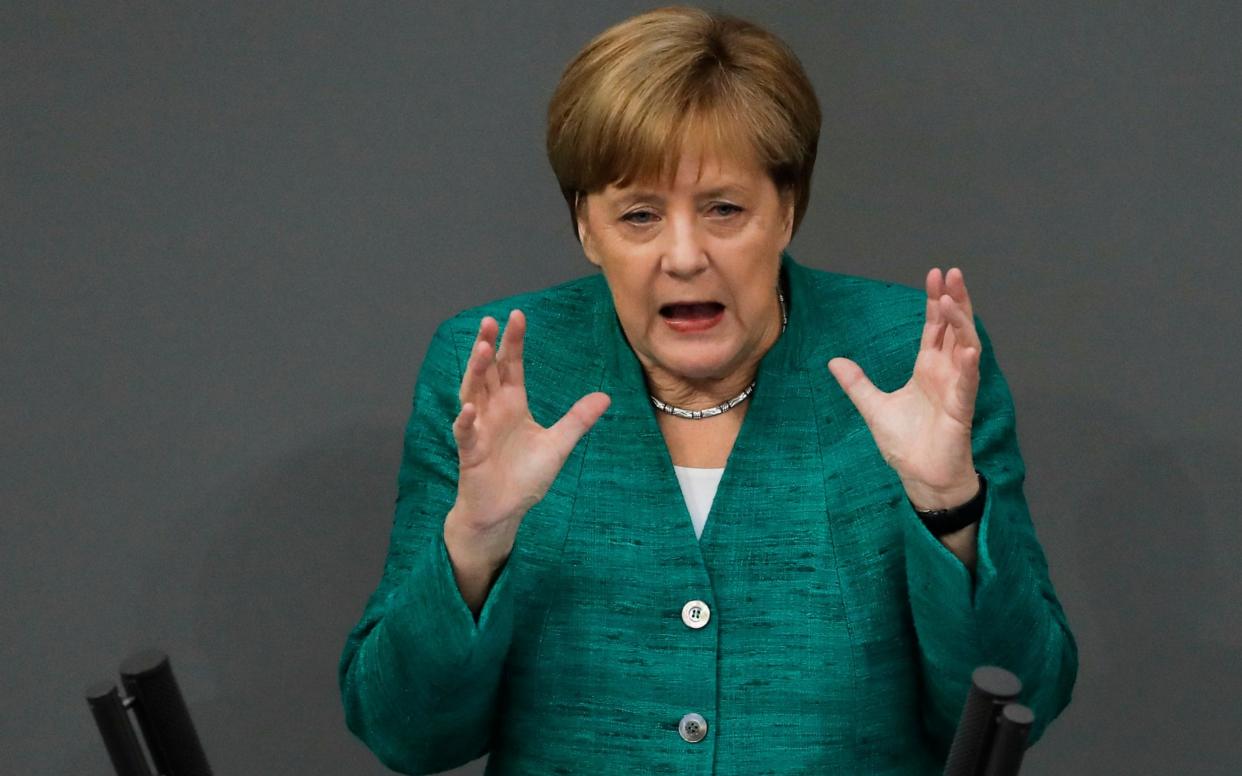Angela Merkel warns migration challenge could 'determine Europe's destiny'

The European Union embraced a new hardline agenda to defend its borders against illegal migration last night as Angela Merkel warned that the fate of the bloc depended on addressing the three-year crisis over migration.
Europe’s growing crop of populist leaders claimed victory for their “Fortress Europe” agenda which saw the European Council summit in Brussels putting deterrence and the protection of EU borders at the forefront of its migration policy.
“Europe has many challenges but migration could end up determining Europe's destiny,” Mrs Merkel told the German parliament before the summit, with her own political future hanging in the balance following a rebellion against her softer migration policies by her Bavarian coalition partners.
The draft summit conclusions showed the German leader’s long-standing calls for an inclusive approach to migration playing second fiddle to the need to secure Europe's borders and process illegal migrants off-shore so they could be returned to their countries of origin.
In a sign of the high stakes at the table Italy took the highly unusual step of blocking the entire summit conclusions in order to extract concessions on migration. The move forced Jean-Claude Juncker the EU Commission president to cancel a planned press conference.
Senior Brussels sources said that Italy was demanding that the EU agreed that every migrant arriving in Italy was “arriving in Europe” in a bid to force other EU states to share the burden of migration.
Italy was also demanding urgent reforms to the Dublin regulation and a European wide commitment to rescuing migrants in the Mediterranean.
“We’re willing to work through the night to get this,” said an Italian source involved in the talks.
Emmanuel Macron the Fench President posted a photograph on Twitter of him and his Italian counterpart working on drafts of the conclusions as all sides worked to broker a late-night compromise.
Sebastian Kurz, the conservative Austrian chancellor who is in coalition with the far-right Freedom Party, said the shift to a harder line was a victory for those states who have argued that the EU’s soft approach is creating ‘pull factors’ for migration.
Merkel's migration tensions | Read more
“It seems as if today we will manage a shift in migration policy,” he said, adding that being rescued in the Mediterranean “must not automatically become a ticket” to central Europe.
“That’s important because we have asked for a systemic change for years. For years we have demanded reductions in the number of people coming to Europe illegally. I think that is possible today.”
Viktor Orban, the Hungarian prime minister who put up fences on Hungary’s border with Serbia in 2015 after Mrs Merkel threw open Germany’s border, said the change was a victory for the concerns of Europe’s voters.
“The main issue is not migration, the issue is democracy in Europe ... it is about what the people believe, what should be done," he said before claiming the people wanted migrants to be sent back to where they came from.
He added that the move heralded the start of a “new period when we try to reconstruct the European democracy.”
Mr Orban’s claims of a victory for ‘democracy’ will send shudders through liberal Europe which believes that the Hungarian leader is using the consensus for a harder line over migration as a Trojan horse for a broader illiberal agenda.
Donald Tusk, the European Council president, warned on the eve of the summit that failure to address the migration question risked handing ammunition to populists and those with “a tendency towards overt authoritarianism” - which was widely taken as a reference to the likes of Mr Orban.
But Mr Tusk said that the EU’s measures - which include beefing up Europe’s border force to 10,000, forging return deals with African states and investigating setting up so-called hotspot camps in north Africa - were necessary to avoid something worse.
“Some may think I am too tough in my proposals on migration. But trust me, if we don't agree on them, then you will see some really tough proposals from some really tough guys," he said.
Emmanuel Macron, the French president, said that the measures were not designed to put an the end to the idea of ‘European solutions’ to migration pressures, but to modernise them and enable them to work better.
“We all face a simple choice: do we want national solutions or do we believe in European solutions and cooperation? For my part, I will defend European solutions, in cooperation, in the European Union and under Schengen,” he said
Italy’s new populist government withheld judgement on the proposals, after a month in which it has refused permission for NGO migrant rescue ships to dock at its ports and demanded EU states share the burden of the 600,000 migrants that have arrived in the last two years.
Guiseppe Conte, the Italian prime minister, welcomed the proposals and pledges to do more to help Italy, but made clear that his government - which has already catalysed the debate - would continue to push for real outcomes.
“We hope these words will be translated into action,” he said. “Italy no longer has a need for words and statements, we need concrete acts.”

